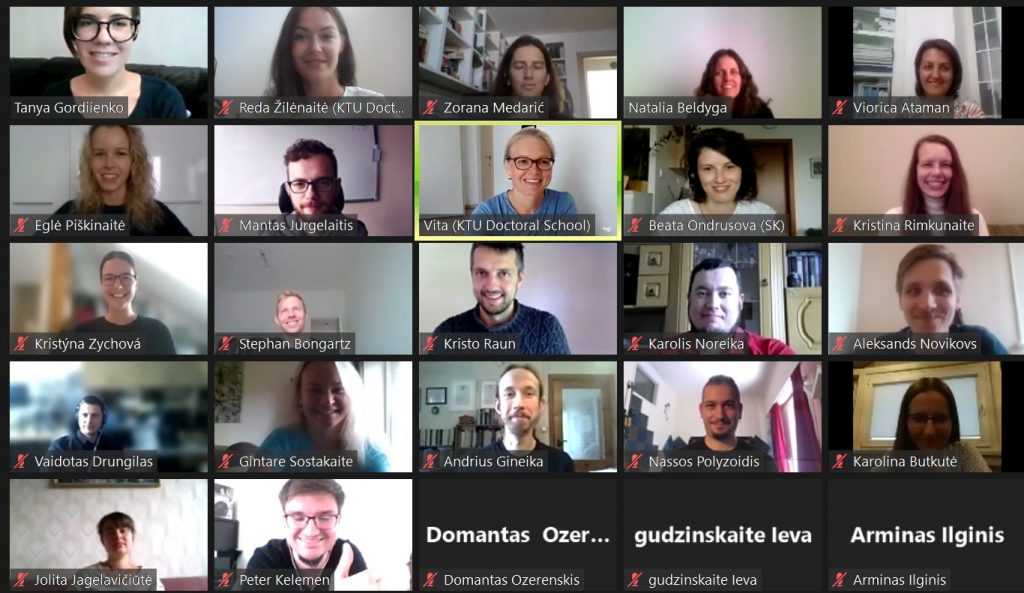The KTU International PhD Summer School, which attracted many Lithuanian and international PhD students has become a tradition for the last days of summer. This year, the five-day event, organised by the Kaunas University of Technology (KTU) Doctoral School, took place online.
The international annual event brings together lecturers from around the world; the main focus of the seminars and lectures were the PhD students’ communication, general and networking skills, and international relations. Every year, in the PhD Summer School programme, the organisers aim to provide globally relevant topics, which would reflect global trends.
 From the 60 registered applicants, 35 PhD students were chosen to participate in this year’s event. Among them, there were 19 PhD students from Lithuania, 14 of whom were from KTU. The participants’ home countries included the Czech Republic, Estonia, Italy, Latvia, Moldova, the Netherlands, Slovakia, Slovenia, Switzerland, the United Kingdom, and Ukraine.
From the 60 registered applicants, 35 PhD students were chosen to participate in this year’s event. Among them, there were 19 PhD students from Lithuania, 14 of whom were from KTU. The participants’ home countries included the Czech Republic, Estonia, Italy, Latvia, Moldova, the Netherlands, Slovakia, Slovenia, Switzerland, the United Kingdom, and Ukraine.
“We have noticed that both during the event and after it the participants forge useful connections and discover common interests not only in their scientific and professional fields but also outside of them. We have exceptional examples of friendships lasting from our first for PhD Summer School in 2016,” says Vita Daudaravičienė, the KTU Doctoral School Project Manager.
In the International PhD Summer School programme, the lectures were held by guest speakers, lecturers and professionals from all over Europe. In his seminars, Hallvard Fossheim from the University of Bergen was focusing on responsibility, interaction, and ethics in research. Numerous topics on scientific writing were introduced by Frank Witlox from the University of Ghent. Nicolas Dintzner from the Delft University of Technology talked about research data management for PhDs. Intellectual property rights for researchers were discussed by Domenico Golzio from European Patent Academy. An effective scientific presentation with the focus on inspiring the audience was presented by Wim Blokzijl from the Delft University of Technology.
For each of the topics, the participants had to execute homework tasks and submit them before the end of the event. The PhD students who completed the entire programme received participation certificates.
Also, during the first day of the Summer School, a poster session “Speak your science” was held, during which the participants had 2 minutes to introduce their research. The winners were nominated in four categories: Engineering and Technology, Social Sciences and Humanities, Natural and Health Sciences, and the Best Presentation.
“I am pleased to have had a possibility introduce the results of my work. In addition, as I work with large amounts of data, I enjoyed the training in research data management. Knowledge and advice on writing scientific articles and public speaking, I believe, will also be beneficial”, says Beata Ondrusova, a PhD student from Slovakia.
However, not only science topics were on the programme of the Summer School, the participants of the event were also asked to join a virtual tour of Lithuania and Kaunas city, to take part in virtual science games.
“One evening we also organised a remote Pink Soup Competition, when in real-time the participants could produce cold borscht, taste them and share their emotions, impressions and photos. Doctoral students were amazed by this unique pink soup”, says Vita Daudaravičienė.
Natalia Bełdyga, a PhD student from Poland, said that the PhD Summer School was intense but full of wonderful emotions and useful experiences: “I learned what is important during the PhD journey. Professionals in this field shared their knowledge and experience with us and provided advice. Also, I met other PhD students, learned about their perspectives, and took on new challenges. The organisers created a friendly and pleasant work atmosphere, so everything was just great!”
Between 2016 and 2021, five International PhD Summer Schools were held. In total, 20 guest lecturers and 230 PhD students from 83 institutions in 28 countries took part in the events.